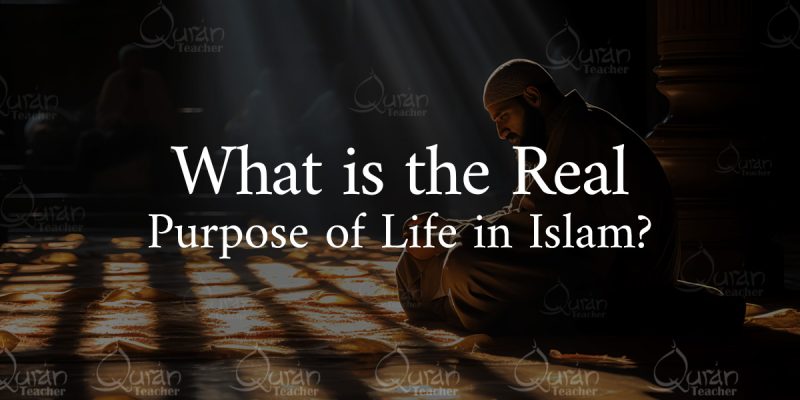Every living being is sent to this world by Allah with a purpose. We will surely return to Him, and He may question whether we fulfilled that purpose or not. We know that Almighty Allah is the sole creator of this world and everything within it and it’s Islam provides the answer to humanity’s quest for meaning. But it’s also very natural to still ponder over the purpose of life: Why were we created? What is our role in this world?
The purpose of creation for all individuals, throughout history, remains singular: to know and worship God. It goes even deeper if you want to know more and you can learn more about it easily with a good Quranic teacher.
To Worship Allah
What is Worship in Islam?
Islam, denoting ‘submission’, defines worship as obedient submission to God’s will. Every entity complies with the physical laws established by God: “To Him belongs whosoever is in the heavens and the earth; all obey His will.” (Qur’an, 30:26) However, mere submission without will doesn’t merit reward or punishment.
Reward and punishment pertain to those who voluntarily worship God, adhering to His moral and religious laws. Worship, central to the message of all prophets, underscores the importance of willingly obeying God’s commandments.
Read More: Teaching Quran in the UK And Connect with Faith
Read More: 5 Best Surah for Anxiety That Will Help You
Allah is the One and Only Creator
We Muslims firmly believe in the existence of One Creator who formed humanity and expects their acknowledgment and service. According to Quranic verses (3:189-191), “And to Allah belongs the dominion of the heavens and the earth, and Allah is over all things competent. Indeed, in the creation of the heavens and the earth and the alternation of the night and the day are signs for those of understanding. Who remember Allah while standing or sitting or [lying] on their sides and give thought to the creation of the heavens and the earth, [saying], “Our Lord, You did not create this aimlessly; exalted are You [above such a thing]; then protect us from the punishment of the Fire.”
Islam distinguishes itself by addressing the ‘what’ and ‘why’ of human existence. Muslims view this life as a preparation for the eternal Hereafter, emphasizing the importance of righteous living based on Quranic teachings. The Quran serves as the ultimate source for Muslims to understand the purpose of the world and human existence.
The Human Role in Islam
In Islam, unlike other creations, humans possess the unique ability to choose whether to submit to God’s will. They can either adhere to their Creator’s laws or opt for disobedience.
The rest of creation lacks this volition. Planets like Earth cannot alter their orbits around the Sun, nor can the Moon decide to orbit a different planet. The universe, apart from humans, unconditionally follows the laws governing it.
Humans hold a pivotal role in life. They are tasked with adhering to divine laws and guiding others towards natural submission. Despite this role, humans possess free will and can shirk their responsibilities.
Even when humans turn away from their purpose, their bodies continue to function according to divine laws. The heart continues pumping blood, supplying oxygen, while the senses—eyes and ears—receive and process information. Despite human disobedience, the body remains obedient to its Creator’s will, allowing individuals to benefit from sight and hearing.
The Purpose of Life in Quranic Teachings
“[Remember] when your Lord extracted from the loins of Adam’s children their descendants and made them testify (saying): ‘Am I not your Lord?’ They said: ‘Yes, we testify to it.’ [This was] in case you say on the Day of Judgment: ‘We were unaware of this.’ Or you say: “It was our ancestors who worshipped others besides God and we are only their descendants. Will you then destroy us for what those falsifiers did?” (Quran, 7:172-173)
Your Quran classes online in the UK make it very easy for you to understand the words of out Holy Book, However, until you sign up we can still help a little. From this verse, it’s evident that Allah initially had all human souls testify to His Lordship, highlighting the paramount importance of acknowledging Him. The primary objective of human existence in Islam revolves around recognizing and knowing the Lord.
Allah also states: “Did you think that We had created you in play (without any purpose) and that you would not be brought back to Us?” (Quran 23:115)
This verse underscores that human existence serves a purpose beyond mere amusement and will culminate in a return to Allah.
Another Quranic verse reads: “Know that the life of this world is but amusement and diversion and adornment and boasting to one another and competition in increase of wealth and children – like the example of a rain whose [resulting] plant growth pleases the tillers; then it dries and you see it turned yellow; then it becomes [scattered] debris. And in the Hereafter is severe punishment and forgiveness from Allah and approval. And what is the worldly life except the enjoyment of delusion.” (Quran 57:20)
This verse elucidates the deceptive nature of worldly life, cautioning against becoming ensnared by its temporary pleasures. Furthermore, Allah states: “I have created the jinn and humankind only for My worship.” (Quran, 51:56)
Here, it’s clear that humanity’s purpose, along with that of the jinn, is to worship Allah. Through worship, Muslims affirm Allah’s Lordship and draw closer to Him, fulfilling the essence of their existence. Dive deeper into this topic once you sign up to learn the Quran online for free.
In another verse, Allah reveals: “Satan’s plan is to incite enmity and hatred among you with intoxicants and gambling and hinder you from the remembrance of Allah and regular prayer. Will you not then abstain?” (Quran, 5:91)
This verse highlights the dangers of succumbing to hatred and diversion, which detract from the central purpose of remembering Allah. Muslims are urged to abstain from evil and adhere to righteousness to fulfill their purpose of knowing the Lord.
The Sunnah and Hadith
Prophet Muhammad’s (peace be upon him) life serves as a guiding model for humanity, showcasing his exemplary qualities as a messenger of Allah.
The teachings of the holy Quran, bestowed by our Creator, intertwine harmoniously with the practices of His final messenger. Muslims are instructed to emulate Prophet Muhammad (peace be upon him) in their daily lives, as stated in Surah 3:31: Say: “If you do love Allah, follow me: Allah will love you and forgive you your sins: for Allah is Oft-Forgiving, Most Merciful.“
The Sunnah encompasses the actions of the last messenger—a divine gift of guidance for humanity. Prophet Muhammad’s (peace be upon him) sayings and deeds, inspired by Allah, epitomize this guidance. His teachings, meticulously narrated by trusted companions, constitute the invaluable source of Hadith. For instance, a Hadith quotes the messenger of Allah: “He who eats to his fill while his neighbor goes without food is not a Believer (of Allah and His teachings).“
A devout Muslim adheres to the teachings of Allah found in the Quran and follows the Sunnah of Prophet Muhammad (peace be upon him), as documented in the Hadith. Through this dual guidance, Muslims strive to embody the principles of faith and righteousness in their lives.
Read More: Quran Verses & Hadith about Jannah
Read More: Houris: The Heavenly Big-Eyed Maidens In The Quraan
Let Quraan Teacher Be Your Guide
Whether you are looking to practice Quran recitation online or are tired of continuously searching ‘female Quran teacher near me,’ know that we are the answer to it all. Sign up and gain a better understanding of your religion with us.

